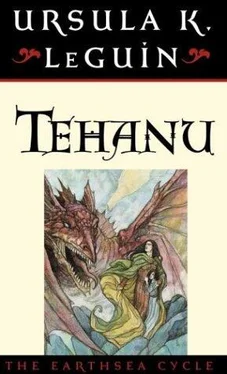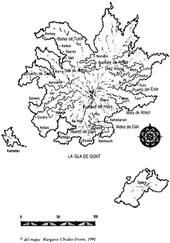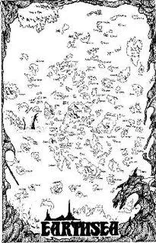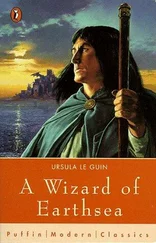Ursula Le Guin - Tehanu The Last Book of Earthsea
Здесь есть возможность читать онлайн «Ursula Le Guin - Tehanu The Last Book of Earthsea» весь текст электронной книги совершенно бесплатно (целиком полную версию без сокращений). В некоторых случаях можно слушать аудио, скачать через торрент в формате fb2 и присутствует краткое содержание. Город: New York, Год выпуска: 1990, Издательство: Atheneum, Жанр: Фэнтези, на английском языке. Описание произведения, (предисловие) а так же отзывы посетителей доступны на портале библиотеки ЛибКат.
- Название:Tehanu The Last Book of Earthsea
- Автор:
- Издательство:Atheneum
- Жанр:
- Год:1990
- Город:New York
- ISBN:нет данных
- Рейтинг книги:4 / 5. Голосов: 1
-
Избранное:Добавить в избранное
- Отзывы:
-
Ваша оценка:
- 80
- 1
- 2
- 3
- 4
- 5
Tehanu The Last Book of Earthsea: краткое содержание, описание и аннотация
Предлагаем к чтению аннотацию, описание, краткое содержание или предисловие (зависит от того, что написал сам автор книги «Tehanu The Last Book of Earthsea»). Если вы не нашли необходимую информацию о книге — напишите в комментариях, мы постараемся отыскать её.
Tehanu The Last Book of Earthsea — читать онлайн бесплатно полную книгу (весь текст) целиком
Ниже представлен текст книги, разбитый по страницам. Система сохранения места последней прочитанной страницы, позволяет с удобством читать онлайн бесплатно книгу «Tehanu The Last Book of Earthsea», без необходимости каждый раз заново искать на чём Вы остановились. Поставьте закладку, и сможете в любой момент перейти на страницу, на которой закончили чтение.
Интервал:
Закладка:
He was looking down at the table, sullen, enduring, like a farmer after a hard day in the fields faced with some domestic squall.
“Nobody will come from Roke, I think,” he said, and it cost him effort enough that it was a while before he went on. “Give me time.”
She thought it was all he was going to say, and replied, “Yes, of course. I’m sorry,” and was rising to clear the table when he said, still looking down, not clearly, “I have that, now.
Then he too got up, and brought his dish to the sink, and finished clearing the table. He washed the dishes while Tenar put the food away. And that interested her. She had been comparing him to Flint; but Flint had never washed a dish in his life. Women’s work. But Ged and Ogion had lived here, bachelors, without women; everywhere Ged had lived, it was without women; so he did the “women’s work” and thought nothing about it. It would be a pity, she thought, if he did think about it, if he started fearing that his dignity hung by a dishcloth.
Nobody came for him from Roke. When they spoke of it, there had scarcely been time for any ship but one with the magewind in her sails all the way; but the days went on, and still there was no message or sign to him. It seemed strange to her that they would let their archmage go untroubled so long. He must have forbidden them to send to him; or perhaps he had hidden himself here with his wizardry, so that they did not know where he was, and so that he could not be recognized. For the villagers paid curiously little attention to him still.
That no one had come down from the mansion of the Lord of Re Albi was less surprising. The lords of that house had never been on good terms with Ogion. Women of the house had been, so the village tales went, adepts of dark arts. One had married a northern lord, they said, who buried her alive under a stone; another had meddled with the unborn child in her womb, trying to make it a creature of
power, and indeed it had spoken words as it was born, but it had no bones. “Like a little bag of skin,” the midwife whispered in the village, “a little bag with eyes and a voice, and it never sucked, but it spoke in some strange tongue, and died “ Whatever the truth of such tales, the Lords of Re Albi had always held aloof. Companion of the mage Sparrowhawk, ward of the mage Ogion, bringer of the Ring of Erreth-Akbe to Havnor, Tenar might have been asked to stay, it would seem, at the mansion house when she first came to Re Albi; but she had not. She had lived instead, to her own delight, alone in a tiny cottage that belonged to the village weaver, Fan, and she saw the people of the great house seldom and at a distance. There was now no lady of the house at all, Moss told her, only the old lord, very old, and his grandson, and the young wizard, called Aspen, whom they had hired from the School on Roke.
Since Ogion was buried, with Aunty Moss’s talisman in his hand, under the beech tree by the mountain path, Tenar had not seen Aspen. Strange as it seemed, he did not know the Archmage of Earthsea was in his own village, or, if he knew it, for some reason kept away. And the wizard of Gont Port, who had also come to bury Ogion, had never come back either. Even if he did not know that Ged was here, surely he knew who she was, the White Lady, who had worn the Ring of Erreth-Akbe on her wrist, who had made whole the Rune of Peace- And how many years ago was that, old woman! she said to herself. Is your nose out of joint?
All the same, it was she who had told them Ogion’s true name. It seemed some courtesy was owing.
But wizards, as such, had nothing to do with courtesy. They were men of power. It was only power that they dealt with. And what power had she now? What had she ever had? As a girl, a priestess, she had been a vessel: the power of the dark places had run through her, used her, left her empty, untouched. As a young woman she had been taught a powerful knowledge by a powerful man and had laid it aside, turned away from it, not touched it. As a woman she had chosen and had the powers of a woman, in their time, and the time was past; her wiving and mothering was done. There was nothing in her, no power, for anybody to recognize.
But a dragon had spoken to her. “I am Kalessin,” it had said, and she had answered, “I am Tenar. “
“What is a dragonlord?” she had asked Ged, in the dark place, the Labyrinth, trying to deny his power, trying to make him admit hers; and he had answered with the plain honesty that forever disarmed her, “A man dragons will talk to.
So she was a woman dragons would talk to. Was that the new thing, the folded knowledge, the light seed, that she felt in herself, waking beneath the small window that looked west?
A few days after that brief conversation at table, she was weeding Ogion’s garden patch, rescuing the onions he had set out in spring from the weeds of summer. Ged let himself in the gate in the high fence that kept the goats out, and set to weeding at the other end of the row. He worked awhile and then sat back, looking down at his hands.
“Let them have time to heal,” Tenar said mildly. He nodded.
The tall staked bean-plants in the next row were flowering. Their scent was very sweet. He sat with his thin arms on his knees, staring into the sunlit tangle of vines and flowers and hanging beanpods. She spoke as she worked:
“When Aihal died, he said, ‘All changed. . . .‘ And since
his death, I’ve mourned him, I’ve grieved, but something lifts up my grief. Something is coming to be born-has been set free. I know in my sleep and my first waking, something is changed.”
“Yes,” he said. “An evil ended. And . . . “
After a long silence he began again. He did not look at her, but his voice sounded for the first time like the voice she remembered, easy, quiet, with the dry Gontish accent.
“Do you remember, Tenar, when we came first to Havnor?”
Would I forget? her heart said, but she was silent for fear of driving him back into silence.
“We brought Lookfar in and came up onto the quai-the steps are marble. And the people, all the people-and you held up your arm to show them the Ring. . . .
-And held your hand; I was terrified beyond terror: the faces, the voices, the colors, the towers and the flags and banners, the gold and silver and music, and all I knew was you-in the whole world all I knew was you, there by me as we walked. . . .
“The stewards of the King’s House brought us to the foot of the Tower of Erreth-Akbe, through the streets full of people. And we went up the high steps, the two of us alone. Do you remember?”
She nodded. She laid her hands on the earth she had been weeding, feeling its grainy coolness.
“I opened the door. It was heavy, it stuck at first. And we went in. Do you remember?”
It was as if he asked for reassurance- Did it happen? Do I remember?
“It was a great, high hall,” she said. “It made me think of my Hall, where I was eaten, but only because it was so high. The light came down from windows away up in the tower. Shafts of sunlight crossing like swords.”
“And the throne,” he said.
“The throne, yes, all gold and crimson. But empty. Like the throne in the Hall in Atuan. ‘ ‘
“Not now,” he said. He looked across the green shoots of onion at her. His face was strained, wistful, as if he named a joy he could not grasp. “There is a king in Hay-nor,” he said, “at the center of the world. What was foretold has been fulfilled. The Rune is healed, and the world is whole. The days of peace have come. He-”
He stopped and looked down, clenching his hands.
“He carried me from death to life. Arren of Enlad. Lebannen of the songs to be sung. He has taken his true name, Lebannen, King of Earthsea. “
Читать дальшеИнтервал:
Закладка:
Похожие книги на «Tehanu The Last Book of Earthsea»
Представляем Вашему вниманию похожие книги на «Tehanu The Last Book of Earthsea» списком для выбора. Мы отобрали схожую по названию и смыслу литературу в надежде предоставить читателям больше вариантов отыскать новые, интересные, ещё непрочитанные произведения.
Обсуждение, отзывы о книге «Tehanu The Last Book of Earthsea» и просто собственные мнения читателей. Оставьте ваши комментарии, напишите, что Вы думаете о произведении, его смысле или главных героях. Укажите что конкретно понравилось, а что нет, и почему Вы так считаете.








